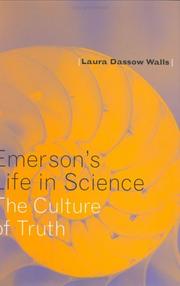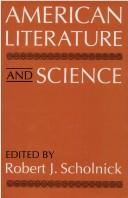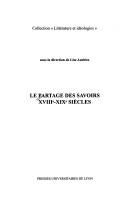| Listing 1 - 5 of 5 |
Sort by
|
Book
ISBN: 0813065267 0813057396 081306628X Year: 2020 Publisher: Gainesville, Florida : University Press of Florida,
Abstract | Keywords | Export | Availability | Bookmark
 Loading...
Loading...Choose an application
- Reference Manager
- EndNote
- RefWorks (Direct export to RefWorks)
"Joyce and Geometry" reveals the full extent to which the modernist writer James Joyce was influenced by the radical theories of non-Euclidean geometry. Tracing Joyce's obsession with measuring and mapping space throughout his works, Ciaran McMorran delves into a major theme in Joyce's work that has not been thoroughly explored until now.

ISBN: 0801440440 1501717391 Year: 2018 Publisher: Ithaca, NY : Cornell University Press,
Abstract | Keywords | Export | Availability | Bookmark
 Loading...
Loading...Choose an application
- Reference Manager
- EndNote
- RefWorks (Direct export to RefWorks)
Ralph Waldo Emerson has traditionally been cast as a dreamer and a mystic, concerned with the ideals of transcendentalism rather than the realities of contemporary science and technology. In Laura Dassow Walls's view Emerson was a leader of the secular avant-garde in his day. He helped to establish science as the popular norm of truth in America and to modernize American popular thought. In addition, he became a hero to a post-Darwinian generation of Victorian Dissenters, exemplifying the strong connection between transcendentalism and later nineteenth-century science.In his early years as a minister, Emerson read widely in natural philosophy (or physics), chemistry, geology, botany, and comparative anatomy. When he left the church, it was to seek the truths written in the book of nature rather than in books of scripture. While visiting the Paris Museum of Natural History during his first European tour, Emerson experienced a revelation so intense that he declared, "I will be a naturalist." Once he was back in the United States, his first step in realizing this ambition was to deliver a series of lectures on natural science. These lectures formed the basis for his first publication, Nature (1836), and his writings ever after reflected his intense and continuing interest in science.Walls finds that Emerson matured just as the concept of "the two cultures" emerged, when the disciplines of literature and science were divorcing each other even as he called repeatedly for their marriage. Consequently, Walls writes, half of Emerson's thought has been invisible to us: science was central to Emerson, to his language, to the basic organization of his career. In Emerson's Life in Science, she makes the case that no study of literary history can be complete without embracing science as part of literature. Conversely, she maintains, no history of science is complete unless we consider the role played by writers of literature who helped to install science in the popular imagination.
Emerson, Ralph Waldo --- Science in literature --- Sciences dans la littérature --- Wetenschappen in de literatuur --- Literature and science --- Science in literature. --- History --- Emerson, Ralph Waldo, --- Knowledge --- Science. --- Science --- United States --- 19th century
Book
ISBN: 9782753521148 275352114X 2753557861 Year: 2012 Publisher: Rennes: Presses universitaires de Rennes,
Abstract | Keywords | Export | Availability | Bookmark
 Loading...
Loading...Choose an application
- Reference Manager
- EndNote
- RefWorks (Direct export to RefWorks)
À l'aube du XXIe siècle, le théâtre britannique trouve dans les sciences une nouvelle source d'inspiration. De la thermodynamique à la mécanique quantique, des mathématiques du chaos à la neurologie, les sciences exactes entrent en scène, dans des œuvres aussi diverses que celles des dramaturges Tom Stoppard, Caryl Churchill et Sarah Kane, ou des compagnies On Theatre et Complicite. Ce dialogue avec le laboratoire, qui oscille entre l'imitation d'un modèle rationnel et la critique d'un lieu de pouvoir, témoigne toujours d'une fascination envers l'imaginaire scientifique de notre époque. Car c'est avant tout un rôle poétique que joue le discours scientifique dans ce théâtre. De thème, la science y devient langage, fournissant des métaphores et des structures narratives à des dramaturgies incertaines, caractérisées par une esthétique postmoderne de la vérité multiple et de l'ouverture du sens. À travers ces différentes façons de mettre en jeu la science, c'est un renouvellement des langages dramatique et scénique que proposent les artistes contemporains.
English drama --- Theater --- Science in literature. --- Théâtre anglais --- Théâtre --- Sciences dans la littérature --- History and criticism. --- History --- Histoire et critique --- Histoire --- Théâtre anglais --- Théâtre --- Sciences dans la littérature --- théâtre --- théâtre anglais --- science

ISBN: 0813117852 9780813117850 132259385X 0813149436 0813193419 Year: 2010 Publisher: Lexington, Kentucky : The University Press of Kentucky,
Abstract | Keywords | Export | Availability | Bookmark
 Loading...
Loading...Choose an application
- Reference Manager
- EndNote
- RefWorks (Direct export to RefWorks)
Literature and science are two disciplines are two disciplines often thought to be unrelated, if not actually antagonistic. But Robert J. Scholnick points out that these areas of learning, up through the beginning of the nineteenth century, ""were understood as parts of a unitary endeavor."" By mid-century they had diverged, but literature and science have continued to interact, conflict, and illuminate each other. In this innovative work, twelve leaders in this emerging interdisciplinary field explore the long engagement of American writers with science and uncover science's conflicting meani
American literature --- Thematology --- Science in literature --- Sciences dans la littérature --- Wetenschappen in de literatuur --- History and criticism --- Literature and science --- United States --- Franklin, Benjamin --- Jefferson, Thomas --- Poe, Edgar Allan --- Thoreau, Henry David --- Twain, Mark --- Crane, Harold Hart --- Science in literature. --- History and criticism. --- Poetry and science --- Science and literature --- Science and poetry --- Science and the humanities

ISBN: 2729707336 9782729707330 2729710841 Year: 2003 Volume: *6 Publisher: Lyon Presses Universitaires de Lyon
Abstract | Keywords | Export | Availability | Bookmark
 Loading...
Loading...Choose an application
- Reference Manager
- EndNote
- RefWorks (Direct export to RefWorks)
L'objet de ce livre est d'étudier les étapes de la transmission des connaissances aux xviiie et xixe siècles et d'observer dans quelle mesure elle s'est effectuée dans et par la littérature. Le xviiie siècle s'est intéressé aux sciences, mais cet intérêt était souvent associé à des pratiques de sociabilité mondaine et aristocratique. Rendre la science « populaire », c'était être capable de la rendre aimable auprès des gens du monde. L'intérêt pour les sciences est évidemment aussi l'une des grandes caractéristiques de la pensée des Lumières. Or l'étude de la diffusion des savoirs permet de voir à quel point le grand rêve encyclopédique initié en 1751 par Diderot et d'Alembert, se prolonge tout au long du xixe siècle. La Révolution ne marque pas un temps d'arrêt dans ce domaine. Bien qu'il existe pendant la Terreur une méfiance à l'égard du monde savant, la Révolution est surtout le moment où l'utopie d'une pédagogie des sciences destinée à tous, telle que l'avaient rêvée certains philosophes des Lumières, devient réalité. Les écrits de Condorcet consacrant la prééminence des sciences sur les belles-lettres, la fondation de l'École polytechnique et du Conservatoire des arts et métiers, la création de l'Institut en 1795, tout converge alors pour installer le savant au cœur de la cité et lui faire jouer un rôle social de premier plan. Bientôt se développent des journaux et des collections spécialisés dans la diffusion des sciences et des techniques pour le grand public. Le cercle de la transmission s'élargit considérablement : les amateurs éclairés du xviiie siècle cèdent la place à tous ceux, enfants, femmes et autodidactes issus des élites ouvrières, qui considèrent que l'émancipation sociale passe par le combat contre l'ignorance. De cet élan, de la conviction que le progrès des sciences entraîne le progrès moral et conduit au bonheur de l'humanité, la littérature se fait largement l'écho. Au xviiie siècle, on en trouve les premiers signes chez des écrivains…
French literature --- Science --- anno 1700-1799 --- anno 1800-1899 --- Science in literature --- Sciences dans la littérature --- Littérature française --- History and criticism --- Histoire et critique --- Sciences dans la litterature --- Litterature francaise --- 094:5/6 --- 159.953.5 --- 168.52 --- 840 "17/18" --- Oude en merkwaardige drukken. Kostbare en zeldzame boeken. Preciosa en rariora-:-Exacte en toegepaste wetenschappen --- Leren. Verwerven van kennis --- Empirische wetenschappen --- Franse literatuur--18e en 19e eeuw. Periode 1700-1899.--(eveneens voor boeken over recht periode 1789-1799) --- 840 "17/18" Franse literatuur--18e en 19e eeuw. Periode 1700-1899.--(eveneens voor boeken over recht periode 1789-1799) --- 168.52 Empirische wetenschappen --- 159.953.5 Leren. Verwerven van kennis --- 094:5/6 Oude en merkwaardige drukken. Kostbare en zeldzame boeken. Preciosa en rariora-:-Exacte en toegepaste wetenschappen --- Sciences dans la littérature --- Littérature française --- Literature --- savoir --- littérature --- transmission --- Transmission de textes --- Sciences --- Littérature et sciences Congrès --- Édition scientifique --- Savoir et érudition --- France --- 18e siècle --- Vulgarisation --- 19e siècle --- Dans la littérature
| Listing 1 - 5 of 5 |
Sort by
|

 Search
Search Feedback
Feedback About UniCat
About UniCat  Help
Help News
News